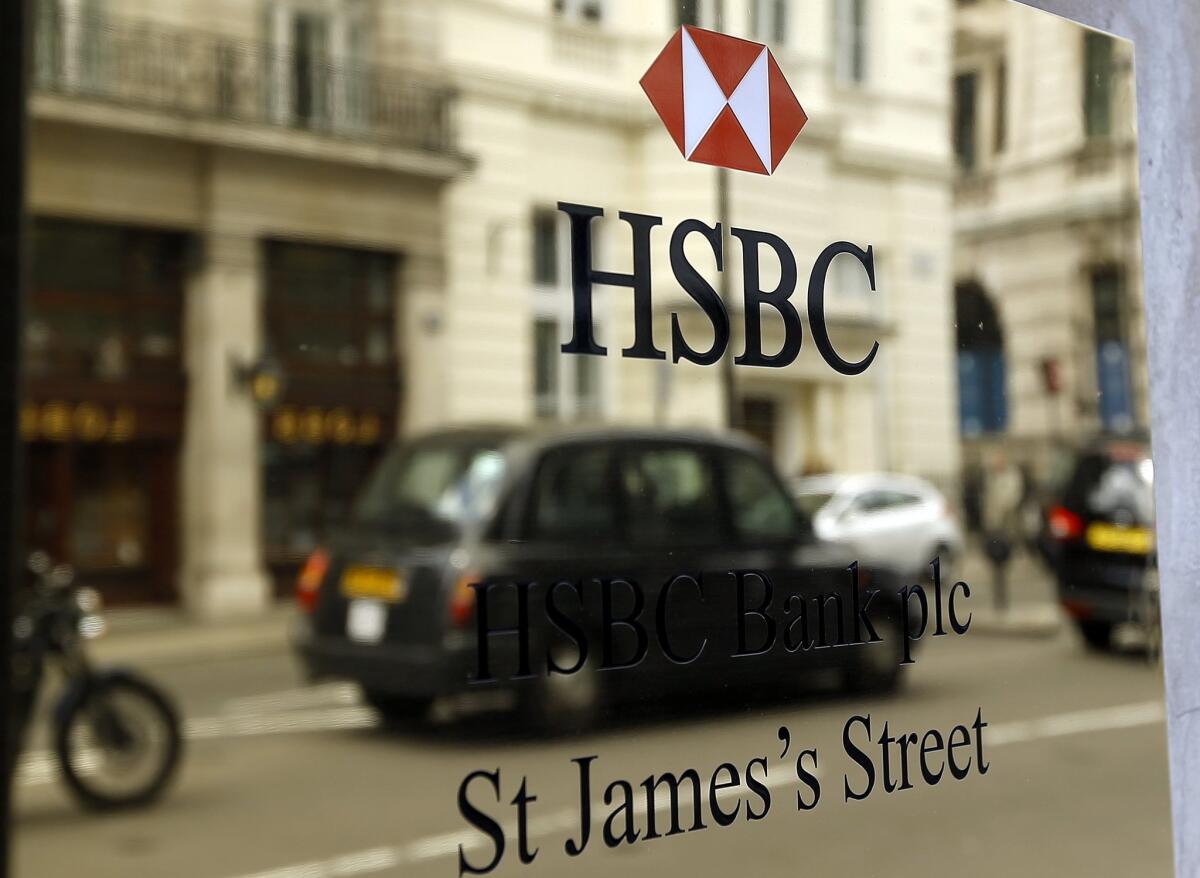HSBC to cut 35,000 jobs as it wrestles with global challenges

- Share via
HSBC will shed some 35,000 jobs as part of a deep overhaul to focus on faster-growing markets in Asia and as it tries to cope with a slew of global uncertainties, including Brexit, trade wars and the coronavirus outbreak.
The interim chief executive, Noel Quinn, said Tuesday the number of people employed by the bank would fall from 235,000 to 200,000 in the next three years. Some of the reductions would come from attrition as opposed to outright cuts.
The London bank, which does most of its business in Asia, plans to revamp its U.S. and European business and shed $100 billion in assets to improve profitability.
HSBC had 10,000 U.S. employees as of Dec. 31, according its 2019 annual report. A spokesman declined to say how many would be affected by the reductions.
The bank apparently plans to shut at least some of its U.S. branches, saying on its website to expect “a leaner more efficient branch footprint.” Meanwhile, it plans to grow its international-client corporate banking business in the U.S.
HSBC is caught among myriad uncertainties, including Brexit effects, the Hong Kong protests and trade disputes between the United States and China. Now the coronavirus is adding further uncertainty.
The bank’s net profit fell 53% to $6 billion in 2019 and, for this year, it warned of “significant disruption” to its business because of the coronavirus outbreak, which is centered in China.
HSBC’s operations in Europe are also under pressure. It must now also grapple with Britain’s departure from the European Union and the uncertainty that will accompany negotiations for future trade relations.
“No trade negotiation is ever straightforward,” HSBC said in a statement. “It is essential that the eventual agreement protects and fosters the many benefits that financial services provide to both the U.K. and the EU.”
HSBC’s U.S.-traded shares slid 5.6% on Tuesday.
The whopping head count drop comes amid a downsizing in Europe. The restructure involves “consolidating” some parts of the business and “reorganizing the global functions and head office,” Quinn said.
The bank has been carrying out a corporate overhaul designed to boost profitability by focusing on high-growth markets in Asia while shedding businesses and workers in other countries.
“Our immediate aims are to increase returns, create the capacity to invest in the future, and build a platform for sustainable growth,” Quinn said in the statement.
The sharp drop in 2019 profit reflected slower economic activity but also a $7.3-billion write-down for HSBC’s Global Banking and Markets and Commercial Banking divisions in Europe. Revenue rose 5.9% in 2019 to $55.4 billion.
The bank said it would shrink its sales and trading and equity research in Europe and shift resources to Asia.
The restructuring is expected to cost $6 billion, plus $1.2 billion for asset sales, mainly in 2020 and 2021, the bank said.
Richard Hunter, head of markets at Interactive Investor, said the toxic mix of pressures also comes at the same time that current net interest rate environment has dropped — to 1.58% from 1.66% — “with few if any signs on the horizon of an uplift.” Banks tend to make less money when rates are low as it squeezes their lending business.
“There remain more questions than answers as HSBC looks to overhaul its business in radical fashion,” Hunter wrote. “Quite apart from the economic challenges, there remains space at the top for a replacement chief executive, the search for whom is an additional distraction. The bank seems determined to target its unacceptably performing units, but this will take time, courage and capital.”
Chicago Tribune staff writer Robert Channick contributed to this report.
More to Read
Inside the business of entertainment
The Wide Shot brings you news, analysis and insights on everything from streaming wars to production — and what it all means for the future.
You may occasionally receive promotional content from the Los Angeles Times.










